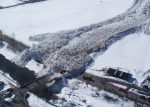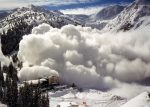The European avalanche warning services seperates avalanche sizes into five size classes (based on the Canadian classification). The avalanche size class is defined, among other factors, by the potential damage caused, especially to infrastructure.
Under this definition, fatal ‘skier-triggered avalanches’ are often classified as ‘medium’ or (barely) as ‘large’ avalanches despite their considerable relative size, they are typically 150 m in length with dimensions of some 50 m by 80 m with an average slab thickness of around 50 cm. This is equivalent to a slab volume of approximately 2’000 m³ or around 400 tonnes of snow. In the following we present the different size classes with their potential damage, run out and typical dimensions.




